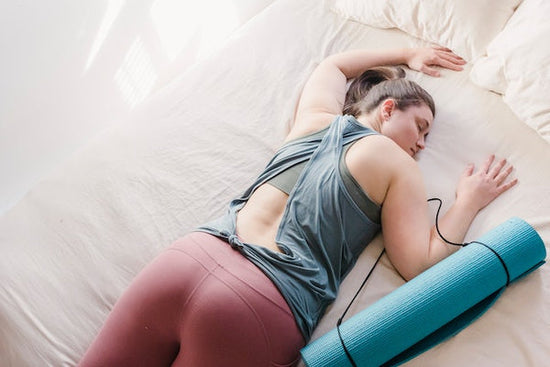A good night's sleep is not just about feeling refreshed in the morning; it is essential for the overall health of your heart. A myriad of studies suggest that the quality and quantity of sleep we get can significantly impact heart health. This article explores the various sleeping positions and habits that can promote heart health.
Understanding the Connection Between Sleep and Heart Health
The heart is a tireless worker, pumping blood throughout the body 24/7. As with any hard-working machine, it needs rest periods to function efficiently. Sleep offers the heart a much-needed respite. During sleep, the heart rate and blood pressure drop, giving the heart less work.
People who don't get enough sleep or have poor quality sleep often have higher levels of stress hormones and inflammation in their bodies. This can lead to high blood pressure, which is a known risk factor for heart disease. Furthermore, lack of sleep has been linked to unhealthy lifestyle behaviors such as smoking, lack of exercise, and poor eating habits, which are all detrimental to heart health.
Adopting the Optimal Sleep Position:

Sleeping on Your Left Side
Among the various sleeping positions, lying on your left side is often considered the best way to sleep for a healthy heart. This position is believed to improve circulation and reduce the workload on the heart. When you sleep on your left side, gravity can facilitate lymph drainage and aid in the removal of waste from the body. This can reduce inflammation and lower stress on the heart.
However, it is crucial to maintain a moderate pillow height when sleeping on your side to ensure proper alignment of the spine and to avoid any unnecessary strain on the neck and back. If you're interested in learning more about the benefits of sleeping on your left side, you can check out this informative article on sleeping on your left side.
Creating a Sleep-Inducing Environment
Establishing an environment conducive to sleep is as important as the position you sleep in. Your bedroom should be a sanctuary dedicated to rest and relaxation. We have some additional tips here!
Optimize the Temperature
Keep the room cool. The National Sleep Foundation suggests that the ideal temperature for sleep is around 65 degrees Fahrenheit (18 degrees Celsius). A cooler environment is believed to aid in the natural drop in core body temperature that occurs during sleep, which can, in turn, improve sleep quality and have positive effects on heart health.
Minimize Noise and Light
Exposure to noise and light can interfere with your sleep. Make sure your room is as quiet as possible. If you can’t control the noise, consider using earplugs or a white noise machine. Likewise, make your room as dark as possible. Blackout curtains and eye masks are excellent tools for blocking out light.
Building a Heart-Healthy Sleep Routine
Maintain a Consistent Sleep Schedule
Going to bed and waking up at the same time every day, even on weekends, helps regulate your body's sleep-wake cycle. This consistency can improve the quality of your sleep, which is beneficial for your heart.
Wind Down Before Bed
It's important to give your mind and body time to transition into sleep mode. Establish a relaxing bedtime routine, such as reading a book, taking a warm bath, or practicing deep breathing exercises. Avoid activities that are stimulating or stress-inducing.
The Role of Diet and Exercise
The Timing and Choice of Meals
What you eat and when you eat can also affect how you sleep. Avoiding large meals and consuming caffeine close to bedtime can help promote better sleep. Instead, consider opting for a light, healthy snack if you're feeling a little hungry. If you're interested in learning more about the connection between nutrition and sleep, check out this insightful article titled "Fuel Your Dreams" that delves into the impact of nutrition on sleep quality and overall well-being.
Regular Physical Activity
Engaging in regular physical activity is not only good for your heart but can also help you sleep better. However, avoiding vigorous exercise close to bedtime is best as it can be too stimulating.

When to Seek Professional Help
While adjusting sleeping positions and creating a conducive environment can be helpful, it's essential to recognize when professional intervention is necessary. If you've made changes to your sleep habits and environment but still find it difficult to fall asleep or stay asleep, it might be time to consult a healthcare professional.
Identifying Sleep Disorders
Sleep disorders such as sleep apnea, insomnia, or restless leg syndrome can seriously affect sleep quality and heart health. For instance, sleep apnea, which causes repeated interruptions in breathing during sleep, can lead to high blood pressure and irregular heartbeats. Recognizing and treating these conditions is vital for both sleep quality and heart health.
Consulting a Healthcare Professional
If you suspect that you have a sleep disorder or if your sleep difficulties are impacting your quality of life and potentially your heart health, it's essential to consult a healthcare professional. They can help diagnose any underlying sleep disorders and recommend appropriate treatments or interventions.
The Significance of Mental Health
It’s important not to overlook mental health's role in sleep quality and heart health.
Managing Stress and Anxiety
High levels of stress and anxiety are known to affect sleep quality. Engage in stress-reducing activities such as yoga, meditation, or spending time with loved ones. These practices not only improve sleep quality but are also beneficial for heart health.
Addressing Depression
Depression is another mental health issue that can affect sleep and is linked to heart disease. If you’re feeling persistently sad or have lost interest in activities you once enjoyed, it’s important to seek help. A healthcare professional can provide you with the necessary guidance and treatment.
In Conclusion: The Best Way to Sleep for a Healthy Heart
Sleep is an integral component of a healthy lifestyle, and its quality and quantity are closely linked to the well-being of your heart. A holistic approach is crucial from adopting the optimal sleeping position to creating a conducive sleep environment and recognizing the significance of diet, exercise, and mental health.
To safeguard your heart, make sleep a priority. Pay attention to your sleep habits and the environment in which you sleep. Adopt a heart-healthy lifestyle that includes a balanced diet, regular exercise, and stress management. Moreover, don’t hesitate to seek professional help if you experience persistent sleep difficulties or suspect an underlying sleep disorder.
By making intentional choices regarding your sleep, you are taking an important step towards better rest, a healthier heart, and a more fulfilling life.
Which sleeping position is good for heart?
Sleeping on the left side is considered the optimal sleeping position for heart health. This position offers several benefits that contribute to a healthier heart. Firstly, it improves circulation by facilitating better blood flow throughout the body. Gravity helps the heart pump blood more efficiently when sleeping on the left side. Additionally, this position reduces the workload on the heart by promoting lymph drainage and aiding in waste removal, which can lower inflammation and stress on the heart. Sleeping on the left side may also help minimize acid reflux, as it keeps the stomach below the esophagus, preventing stomach acid from flowing back into the esophagus. Furthermore, this position can improve breathing, making it beneficial for individuals with sleep apnea or other breathing difficulties. While sleeping on the left side is generally recommended for heart health, personal comfort and preferences should also be considered. It is advisable to consult with a healthcare professional for personalized advice, especially if you have specific health concerns or conditions.
Should you sleep with your feet above your heart?
Sleeping with your feet above your heart is not a typical or recommended sleep position for most people. It is primarily used in medical settings for specific conditions and is not necessary for general sleep. Stick to standard sleep positions that promote comfort and proper body alignment for restful sleep. If you have specific health concerns, consult with a healthcare professional for personalized guidance.
Does elevating legs lower heart rate?
Elevating the legs can help lower heart rate by facilitating venous return and improving blood circulation. When the legs are raised above heart level, it reduces pressure in the leg veins, assisting in the efficient return of blood to the heart. This decreased workload on the heart can result in a lower heart rate. Leg elevation is often recommended for conditions like orthostatic hypotension or post-surgery recovery to enhance blood flow and potentially reduce heart rate. However, individual effects may vary, and it is advised to consult with a healthcare professional for personalized guidance on leg elevation and its impact on heart rate based on specific circumstances.
What is the most unhealthy sleeping position?
The most unhealthy sleeping position is sleeping on your stomach, also known as the prone position. It strains the neck and spine, potentially causing discomfort and misalignment. Sleeping face-down restricts breathing, making it difficult to breathe freely and increasing the risk of shallow breathing or reduced oxygen intake. The prone position can worsen snoring and sleep apnea symptoms by partially blocking the airway. Additionally, it can contribute to facial wrinkles and skin issues due to contact and friction with the pillow. It is generally advised to choose other sleep positions, such as sleeping on your back or side, for better sleep quality and overall health.





